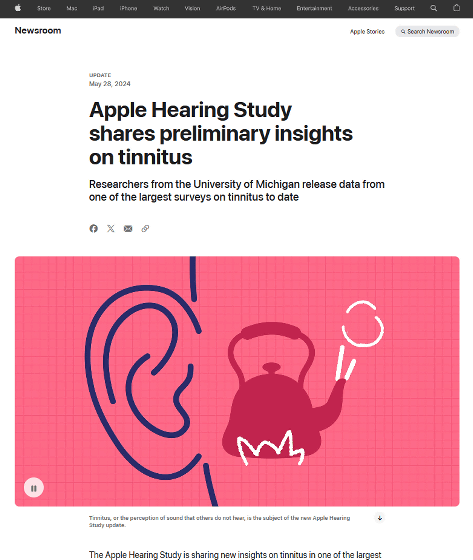Apple announces preliminary findings from the Apple Hearing Study, the largest tinnitus study conducted on iPhone

Apple Hearing Study shares preliminary insights on tinnitus - Apple
https://www.apple.com/newsroom/2024/05/apple-hearing-study-shares-preliminary-insights-on-tinnitus/

Apple Hearing Study shares initial findings on tinnitus – and tips
https://9to5mac.com/2024/05/28/apple-hearing-study-tinnitus/
Through the Apple Research app released in 2019, Apple collects a variety of demographic and health data from iPhone users who have the app installed to support several scientific studies, including the Apple Hearing Study, a large-scale study on tinnitus conducted in collaboration with the University of Michigan.
The Apple Hearing Study aims to analyze how exposure to sound affects hearing, stress, and other hearing-related health conditions. The study has collected data on environmental noise levels over approximately 400 million hours, including questionnaires on the presence or absence of tinnitus and lifestyle changes among more than 160,000 users.
The study found that 77.6% of participants had experienced tinnitus at some point in their lives.

About 15% of participants reported experiencing tinnitus every day, and this percentage increased with age. Participants aged 55 and over were three times more likely to experience tinnitus every day than those aged 18 to 34, and the percentage was 2.7% higher among men than women. Meanwhile, the percentage of men who reported never experiencing tinnitus was 4.8% higher than women.

The majority of participants reported brief tinnitus, but 14.7% reported hearing tinnitus continuously. The proportion of continuous tinnitus increased significantly in participants aged 55 and older, with a whopping 35.8% saying they heard tinnitus constantly.

Regarding the loudness of their tinnitus, 34.4% reported that it was 'annoyingly loud,' while 8.8% reported that it was 'very loud' or 'unacceptably loud.' 10% of participants reported that their tinnitus interfered with their ability to hear sounds clearly.

The Apple Hearing Study also conducted an app-based sound test to determine what sounds participants were hearing with their tinnitus. The majority of participants perceived their tinnitus as either 'pure sound' (78.5%) or 'white noise' (17.4%). Of those who reported hearing pure sound, 90.8% felt they heard high-pitched sounds above 4000Hz. Of those who reported hearing white noise, 57.7% reported hearing a 'steady sound,' 21.7% reported hearing a 'cricket chirp,' 11.2% reported hearing an 'electrical sound,' and 9.4% reported hearing a 'pulsating sound.'

Among the things people who experience tinnitus do to relieve their symptoms, 28% said they use noise machines, 23.7% said they listen to nature sounds, and 12.2% said they practice meditation. Fewer than 2.1% said they use cognitive behavioral therapy to manage their tinnitus.
The mechanism behind tinnitus is complex, so it's difficult to pinpoint a surefire way to prevent it or identify a definitive cause, but Apple says that proper hearing protection and managing stress levels can help reduce the likelihood of tinnitus.
Apple claims that the '

'Tinnitus is a significant life-impacting condition. Trends about tinnitus experiences discovered through the Apple Hearing Study can help us better understand the populations most at risk for tinnitus and, in turn, guide efforts to reduce its impact,' said Richard Neitzel, professor of environmental health sciences at the University of Michigan School of Public Health.
◆ Forum is currently open
A forum related to this article has been set up on the official GIGAZINE Discord server . Anyone can post freely, so please feel free to comment! If you do not have a Discord account, please refer to the account creation procedure article to create an account!
• Discord | 'Have you ever experienced tinnitus? When do you experience tinnitus?' | GIGAZINE
https://discord.com/channels/1037961069903216680/1245321051685126155
Related Posts:
in Science, Posted by log1h_ik







